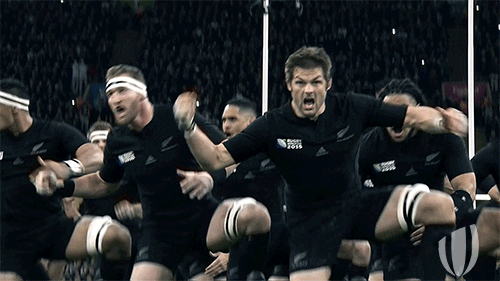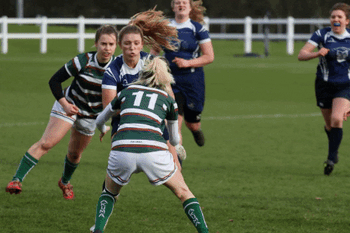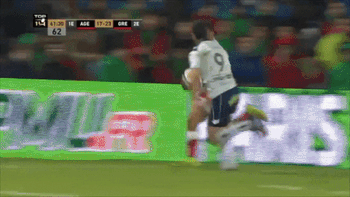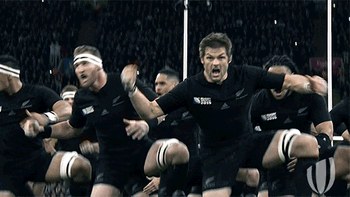Guide to Rugby

The GIST
Rugby is played on a grassy field (known as a pitch) with 15 players per team. It can, however, also be played with just seven players per team in a version that’s called sevens rugby or often just "sevens" (which made its Olympic debut in 2016). There are also other variations of rugby, including rugby football and Aussie rules, which are most commonly played in Australia.
The scoring system in a rugby match is similar (but not exactly) to good ol’ American football. Scoring a try is worth five points and occurs when a player touches the ball down in the end zone (similar to football). After every try is scored, the scoring team has the opportunity to kick a conversion (like a field goal) for two extra points.
Games are divided into two 40-minute halves and time expires when the ball is “dead” (kicked out of bounds) after the 80-minute mark. In sevens rugby, the games are only seven-minute halves because there’s a lot fewer players covering the same size of field, and that’s just tiring AF!
How is rugby organized?
Canada doesn’t have its own professional rugby league (yet!). There are, however, local club rugby teams all across Canada and many high schools and universities have rugby clubs. Aside from our national teams, the most notable team in Canada is the Toronto Wolfpack, the world's first transatlantic rugby team.
- WTF does transatlantic mean?! Well, the team is based in Toronto, but plays in the British Rugby Football League in England. Yep, this means lots of flying, jet lag, Spice Girls, tea, and scones.
Canada also has one MLR (Major League Rugby) team called the Toronto Arrows. The 13-team MLR is the only professional rugby league in North America and held its inaugural season in 2018.
The best of the best
Hockey is synonymous with Canada, right? Well, the same goes for rugby in England, Scotland, Ireland, South Africa, New Zealand, and Australia. Now, if we had to narrow it down to the two best teams in the world, it would be the New Zealand All Blacks and the South African Springbok.
- South Africa has won the Webb Ellis Cup (the trophy for the Rugby World Cup title) four times, the most of any team, while New Zealand is second with three World Cup titles.
Didn’t your mama tell you not to ruck with a girl?
In Canada, rugby isn’t really our thing on the men’s side. So thank goodness the Canadian women kick some serious ass (typical). At the 2016 Rio Olympics, the Canadian women's sevens team captured the bronze medal with a dominant win over Great Britain. These women also won the gold at the 2015 Pan Am Games in Toronto, which really helped grow the sport in Canada. And though the red and white didn't advance out of group play in the 2020 Tokyo Games, perhaps it’s time for you to throw on some cleats and show the boys who’s boss.
Let’s get local
The Toronto Arrows rugby team was founded in 2017 (as the then–Ontario Arrows) and joined the Major League Rugby (MLR) professional league in North America for the 2019 season. They're still the only Canadian team in the otherwise American league.
- This league is the highest level of professional rugby in North America, with a season spanning six months from February through June. Go get 'em, boys!
Arrows Fun Facts:
- Brian Burke (former GM of the Toronto Maple Leafs) is a huge supporter of rugby in Canada and is a part owner of the team.
- Canadian International rugby player John Moonlight retired from international play in late 2018 but came out of of retirement to play for the Arrows in 2019.
And you know we have some trivia…
- You cannot “forward pass” the ball in rugby — it must be thrown backward to a teammate. However, you can kick the ball forward along the ground and then run to grab it!
- The Rugby World Cup (RWC) is hosted every four years. In a landmark decision in 2019, the Rugby World Cup decided to drop gender markings from its tournament names meaning the 2021 women’s edition was the first to be known simply as the Rugby World Cup 2021. #EqualityAF
- You don’t get to pick your jersey number in rugby because jersey numbers are assigned to specific positions. Example: 9 = scrumhalf, 15 = fullback.
- Rugby was invented when William Webb Ellis was playing soccer, caught the ball and ran to the goal while carrying it. Rules are made to broken, right?
Enjoying this article? Want more?

Sign up for The GIST and receive the latest sports news straight to your inbox three times a week.


